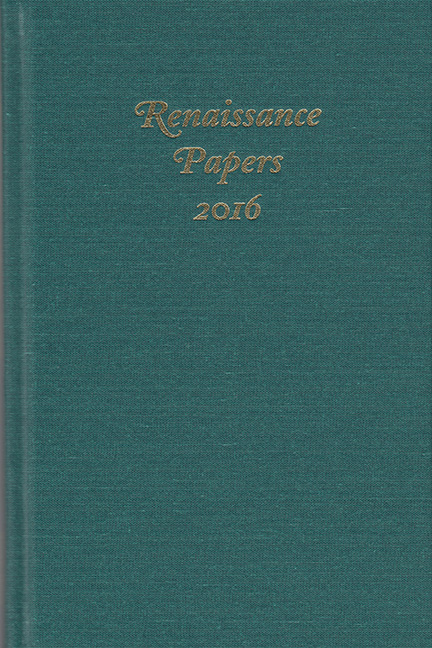Book contents
- Frontmatter
- Contents
- Renaissance Papers
- Beyond Recognition: Mutilation, Marginalia, and the Vicissitudes of Reading
- Velázquez as Reader and the Pictor Doctus in Early Modern Spanish Art
- “Out of this silence yet I picked a welcome”: The Audience in A Midsummer Night's Dream
- Uncommon Justice: The Secret Knowledge and Sagacious Judgment of Old Escalus
- Boundaries in a Globalized World: Shakespeare's Antony and Cleopatra
- Imitation, Innovation, and Imperium: The Grammar School Education of Lear's Daughters
- Violent Brothers, Deadly Antifeminism, and Social Suicide in The Revenger's Tragedy and The Duchess of Malfi
- Canon Fodder: Notes on Don Quijote
Imitation, Innovation, and Imperium: The Grammar School Education of Lear's Daughters
Published online by Cambridge University Press: 23 August 2019
- Frontmatter
- Contents
- Renaissance Papers
- Beyond Recognition: Mutilation, Marginalia, and the Vicissitudes of Reading
- Velázquez as Reader and the Pictor Doctus in Early Modern Spanish Art
- “Out of this silence yet I picked a welcome”: The Audience in A Midsummer Night's Dream
- Uncommon Justice: The Secret Knowledge and Sagacious Judgment of Old Escalus
- Boundaries in a Globalized World: Shakespeare's Antony and Cleopatra
- Imitation, Innovation, and Imperium: The Grammar School Education of Lear's Daughters
- Violent Brothers, Deadly Antifeminism, and Social Suicide in The Revenger's Tragedy and The Duchess of Malfi
- Canon Fodder: Notes on Don Quijote
Summary
IT has often been said of late,” observed Arthur Kinney in 1976, “that King Lear is written in the imperative mood, but it is not; its natural mood is the interrogative.” Kinney makes an apt observation, for King Lear has one of the largest proportions of questions in Shakespeare's canon, and like many of Shakespeare's plays, it is preoccupied with the rhetoric of questions and of questioning. In this paper, I argue that the use and abuse of questions in King Lear reveal Shakespeare's profound skepticism about eloquence as a gateway to, or marker of, authority and about the textbook view that rhetoric and early modern methods for teaching it are means to moral improvement. I explore the rhetorical skillfulness of Goneril and Regan and discuss their proficiency in imitation, which Richard Halpern calls the “principle that animates not only humanist stylistics but also humanist pedagogy,” arguing that imitative practices allow Lear's daughters, as students of rhetoric, to create their own voices through the voices of others. As good grammar school students, they borrow the language and styles of their elders, particularly their habits of questioning, and begin to develop patterns of speech that both emulate and transform their models. The speech of Lear's rhetoricians, like Shakespeare's plays themselves, is both imitative and innovative, copied and original. The rhetorical skill of Goneril and Regan that allows them to adopt and manipulate the speech patterns of their father ultimately facilitates their rise to power. The rhetorical education of these characters has produced subjects who are skilled in imitating obedience to authority, able to mask their subversive tendencies with an outward show of deference when such a show is warranted but also able to throw it off when such deference is no longer useful.
King Lear's concern with rhetoric is apparent from its very first scene in which Lear makes of his daughters an unusual request:
Tell me, my daughters—
Since now we will divest us both of rule,
Interest of territory, cares of state—
Which of you shall we say doth love us most,
That we our largest bounty may extend
Where nature doth with merit challenge.—Goneril,
Our eldest born, speak first.
- Type
- Chapter
- Information
- Renaissance Papers 2016 , pp. 79 - 90Publisher: Boydell & BrewerPrint publication year: 2017

